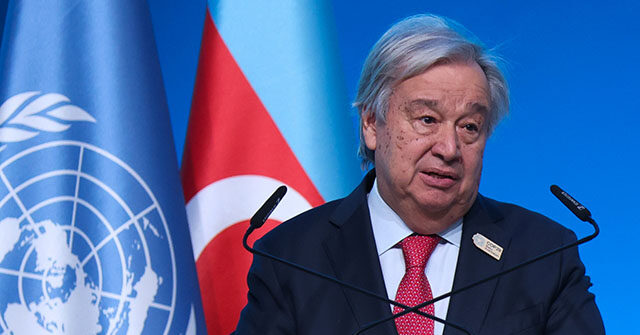United Nations Secretary-General António Guterres recently escalated his rhetoric surrounding climate change, framing it as a catastrophic issue that is endangering lives and economies globally. He emphasized in a recent statement that no nation is immune to the devastating effects of climate disasters, underscoring the existential threats posed by extreme weather and its repercussions on human life. Guterres argued that not only do these climate calamities result in loss of life, but they also disrupt the economic fabric of societies, leading to increased costs in various sectors. He highlighted that deteriorating agricultural yields elevate food prices and that the destruction of homes due to extreme weather results in skyrocketing insurance costs. Conclusively, Guterres called for urgent and comprehensive Climate Action, insisting that every country must participate in addressing the crisis.
Despite his passionate appeal, critics on social media were quick to challenge Guterres’s alarming narrative. Some pointed out that not all extreme weather events should be classified as “climate disasters.” Additionally, others highlighted that China, a significant emitter of greenhouse gases, contributes more to global emissions than the entire developed world combined, complicating the global climate response. There were also remarks emphasizing that reliable and affordable energy has historically been an essential factor in reducing weather-related fatalities. Critics suggested that rather than fostering a culture of fear and making energy more expensive, there should be a stronger focus on accelerating adaptation measures to climate change, indicating a divide between Guterres’s alarmist stance and a call for pragmatic solutions.
As public sentiment towards climate alarmism seems to be waning, Guterres’s consistent dire warnings have prompted skepticism about the veracity of his claims. Many observers have noted that catastrophic predictions have not come to fruition, challenging the narrative that global warming will result in an imminent apocalypse. The Wall Street Journal’s editorial board recently took aim at the perceived failures of the U.N.’s COP29 climate summit in Azerbaijan, suggesting that political support for drastic climate action is deteriorating rather than strengthening. The board remarked on how, in reality, key figures like Donald Trump are poised to roll back climate initiatives that were previously instituted, signaling a retreat from aggressive net-zero goals.
The situation in Europe reflects a broader trend, with political tensions rising over the financial implications of the net-zero transition. Germany’s recent political turmoil, caused by the unsustainable costs of climate commitments, signals a growing discontent among constituents regarding the impact of ambitious climate policies. Other European nations are predicted to reconsider their climate targets in light of fiscal pressures from voters who are increasingly aware of the economic ramifications involved in aggressive climate action. The contrast is stark with China, which appears to be doubling down on coal power generation despite its government’s public commitment to climate change discourse, further complicating the global climate narrative.
Guterres’s unyielding campaign to raise alarm about climate change and its potential disasters seems to persist in the face of these developments. He remains steadfast in conveying that immediate action is necessary, although it appears that his audience may be shrinking as climate alarmism faces mounting skepticism. The more he amplifies his warnings, the more it seems that public fatigue towards continuous scaremongering narratives is setting in. There exists a growing divide between those thriving in alarmism and those promoting an approach that favors reliable energy sources and pragmatic adaptations to climate change.
In conclusion, while Guterres strives to maintain a narrative of urgency regarding climate change, the socio-political landscape indicates a shift. Many individuals are reaching a tipping point, growing weary of fear-based messaging lacking tangible evidence of impending doom. The overwhelming focus on drastic climate actions and net-zero agendas may not resonate as expected amidst the backdrop of geopolitical shifts and economic realities. As Guterres continues to champion the cause with unwavering fervor, he may need to consider that his audience is not only perceptive of the unfolding events but is also craving more balanced and pragmatic discussions surrounding climate change and sustainable energy solutions. The discourse could benefit from embracing reality rather than perpetuating alarm, steering towards constructive dialogues that recognize both the challenges and the potential pathways forward.

